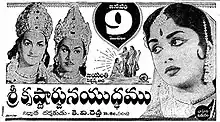Sri Krishnarjuna Yuddhamu
Sri Krishnarjuna Yuddhamu (transl. War between Krishna and Arjuna) is a 1963 Indian Telugu-language Hindu mythological film, produced and directed by K. V. Reddy under the Jayanthi Pictures banner.[1] It stars N. T. Rama Rao, Akkineni Nageswara Rao and B. Saroja Devi, with music composed by Pendyala Nageswara Rao. The film was based on the Telugu play Gayopakhyanam written by Chilakamarti Lakshmi Narasimham in 1890. It was later dubbed into Kannada and into Tamil.[2]
| Sri Krishnarjuna Yuddham | |
|---|---|
 Theatrical release poster | |
| Directed by | K. V. Reddy |
| Written by | Pingali (dialogues) |
| Screenplay by | K. V. Reddy |
| Story by | Chilakamarti Lakshmi Narasimham |
| Based on | Gayopakhyanam (drama) |
| Produced by | K. V. Reddy Pattabhirama Reddy (executive producer) |
| Starring | N. T. Rama Rao Akkineni Nageswara Rao B. Saroja Devi |
| Cinematography | Kamal Ghosh Ravikant Nagaich |
| Edited by | Vasu |
| Music by | Pendyala Nageswara Rao |
Production company | Jayanthi Pictures |
| Distributed by | Vahini Pictures |
Release date | 9 January 1963 |
Running time | 167 mins |
| Country | India |
| Language | Telugu |
Plot
The film begins with Sage Narada, who gives the Parijatha flower to Lord Krishna, who in turn presents it to his consort Rukmini. This annoys Sathyabhama and Krishna tries to pacify her. Balarama decides to perform the marriage of Subhadra with Duryodhana despite objections from his wife, Revathi. Bowing to Subhadra's wish, Krishna performs her marriage with Arjuna without Balarama's knowledge. Meanwhile, the Gandharva king Gaya, after obtaining from Brahma the boon of eternal fame, is returning to his kingdom in his airplane. Unaware that Krishna is paying obeisance to the Sun God, he spits betel leaf which falls into Krishna's praying hands. An angry Krishna swears to kill him. Fear-struck, Gaya runs for protection. Narada tells him to seek protection from Arjuna. Without ascertaining facts, Arjuna assures him protection. To keep to his word, Arjuna wages a war with Krishna. In order to the save Earth from disaster, Lord Siva appears and stops their war. Krishna pardons Gaya.
Cast
- N. T. Rama Rao as Lord Krishna
- Akkineni Nageswara Rao as Arjuna
- B. Saroja Devi as Subhadra
- Gummadi as Dharmaraju
- Mikkilineni as Balarama
- Kanta Rao as Narada Maharshi
- Dhulipala as Gaya
- V. Nagayya as Akrura
- Mukkamala as Duryodhana
- Satyanarayana as Karna
- Prabhakar Reddy as Lord Shiva
- Allu Ramalingaiah as Brahmachari
- Chadalavada as Ayomayam
- Mahankali Venkaiah as Bhima
- S. Varalakshmi as Satyabhama
- Sriranjani Jr. as Rukmini
- Rushyendramani as Wife of Gaya
- Chhaya Devi as Revati
- Surabhi Balasaraswathi as Chandrika
Production
The film was based on the popular Telugu play Gayopakhyanam written by Chilakamarti Lakshmi Narasimham in 1890. K. V. Reddy also produced the film under the Jayanthi Pictures banner.[3][1] The film stars N. T. Rama Rao as Krishna and Akkineni Nageswara Rao as Arjuna. Initially, Nageswara Rao was not keen on acting in a mythological film alongside Rama Rao. However, he accepted the role due to his respect towards K. V. Reddy for having directed Donga Ramudu (1955), the maiden venture of his own production house Annapurna Pictures.[3][4]
Soundtrack
| Sri Krishnarjuna Yuddhamu | |
|---|---|
| Film score by | |
| Released | 1963 |
| Genre | Soundtrack |
| Length | 32:33 |
| Producer | Pendyala Nageswara Rao |
Music composed by Pendyala Nageswara Rao. Lyrics were written by Pingali.[5][6]
| S. No. | Song Title | Singers | length |
|---|---|---|---|
| 1 | "Anni Manchi Sakunamule" | Ghantasala, P. Susheela | 3:24 |
| 2 | "Aligitiva Sakhi Priya Kalata Manava" | Ghantasala | 4:05 |
| 3 | "Manasu Parimalinchene" | Ghantasala, P. Susheela | 4:16 |
| 4 | "Deva Deva Narayana" | Ghantasala | 3:31 |
| 5 | "Anchelanchalu leni Mokshamu" | B. Gopalam, Swarnalatha | 3:03 |
| 6 | "Chaalada Ee Pooja Devi" | Ghantasala | 3:05 |
| 7 | "Neekai Vechitinayya" | P. Susheela | 3:09 |
| 8 | "Swamula Sevaku Velaye" | P. Susheela | 2:37 |
| 9 | "Tapamu Phalinchina Shubhavela" | Ghantasala | 2:21 |
| 10 | "Veyi Subhamulu Kalugu Neeku" | S. Varalakshmi | 3:02 |
Reception
Sri Krishnarjuna Yuddhamu became a commercial success. It was later dubbed into Kannada and Tamil.[2]
References
- Naati 101 Chitralu, S. V. Rama Rao, Kinnera Publications, Hyderabad, 2006, pp: 193-4.
- Film News Anandan (23 October 2004). Sadhanaigal Padaitha Thamizh Thiraipada Varalaru [History of Landmark Tamil Films] (in Tamil). Chennai: Sivakami Publishers. Archived from the original on 21 November 2017.
- యు., వినాయకరావు (28 May 2015). "'కృష్ణార్జున' చిత్రానికి బ్రేక్ ఎందుకు?". Andhra Jyothi (in Telugu). Retrieved 5 October 2022.
- U. Vinayaka Rao 2012, p. 86.
- "Sri Krishnarjuna Yuddham (1963)". Raaga.com. Archived from the original on 31 July 2014. Retrieved 23 January 2021.
- "Sri Krishnarjuna Yudhamu (1963)-Song_Booklet". Indiancine.ma. Archived from the original on 30 January 2021. Retrieved 23 January 2021.
Bibliography
- U. Vinayaka Rao (2012), Telugu Cine Rangam - Pouranika Chitralu, Hyderabad: Telugu Academy, retrieved 6 October 2022